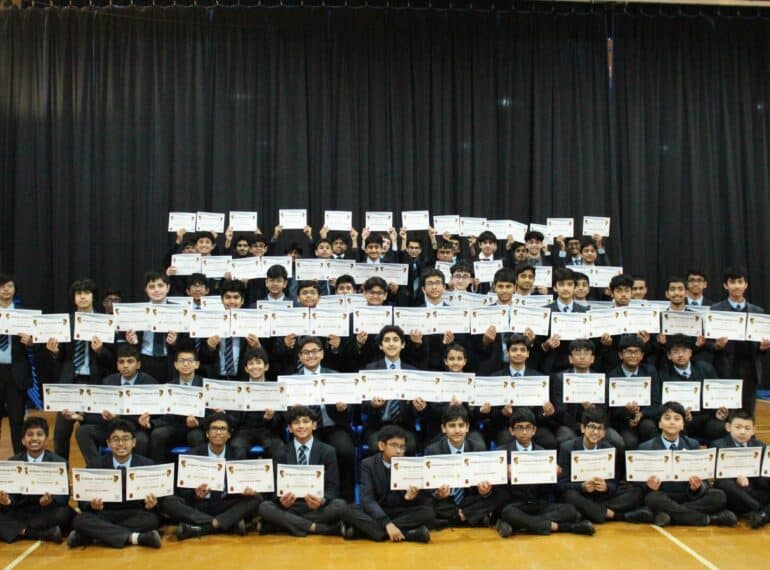Golden generation: QE’s glittering debut in computing aptitude competition

Shown here are QE’s gold award-winners in the UK Bebras Challenge – a competition that aims to introduce pupils to computational thinking.
These winners, representing almost three-quarters of the QE entrants, qualified for their awards after coming in the top 10% of entrants nationally. Among them are 12 pupils, from Years 8 & 9, who achieved a perfect score.
QE’s entrants achieved an average score of 179 points – far ahead of the Hertfordshire and national averages of 112 and 106 respectively.
Head of Digital Teaching and Learning Michael Noonan said: “This was an extraordinary collective performance from our students in their first-ever participation in this competition. The gold award-winners now go on to the next round, called The Coding Challenge, which will be held in School on 24th March – QE’s 452nd anniversary.
“We recognise the importance of digital literacy and are keen to encourage boys’ participation in exciting computing-related events and competitions through our QE Flourish programme.”
The Bebras Challenge is organised by the Raspberry Pi Foundation in partnership with the University of Oxford. It involves tackling a series of interactive tasks designed to encourage logic and problem-solving.
Distinction prizes were awarded to the top 25% of QE performers in the Bebras Challenge’s intermediate (Years 8 & 9) and élite categories (Sixth Form), while merit prizes went to the next 25%.
Best-in-school prizes went to the 12 intermediate category boys with perfect scores of 220: These are, in Year 8: Vivaan Gupta; Aaron Singh; Rishaan Harne; and Noble Laturia. The Year 9 boys are: Kiyan Popat; Ryan Uppal; Aarush Yadav; Aneesh Botcha; Atharva Rao; Avi Aggarwal; Kian Aggarwal; Priyankan Ampalavanar; Arjun Darade; Arnay Gupta; Advik Gupta; Tahiyan Khan; Darsh Nandania; Aaditya Pimple; and Niketh Putta.
Akhilesh Karthikeyan, of Year 12, took the élite prize with his score of 192.
In The Coding Challenge, boys will be able to choose between five skill-based categories, two using the Turtle Blockly programming language, and three that require a text-based language.
- Twenty-five sixth-formers (18 in Year 12 and seven in Year 13) sat the British Informatics Olympiad 2025 first round. BIO aims to encourage students to take an active interest in information technology. The first round involves problems to be solved against the clock with only a pen, paper and a computer. The results will be released later this month.
